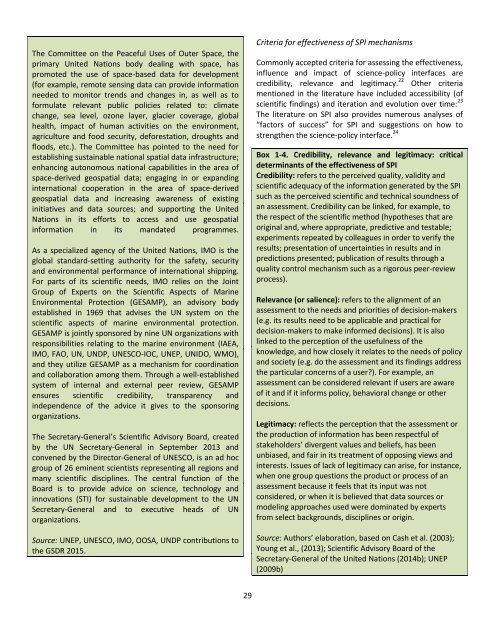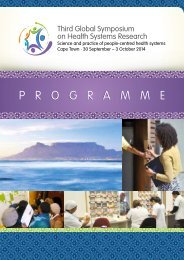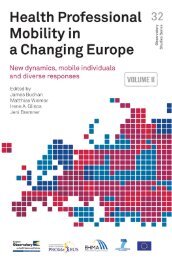Complex relationship between science and policyAs highlighted by the variety of roles that SPIs can play, therelationship between science and policy is not linear, but isbetter seen as a circular or nexus relationship. Science hasdifferent roles to play at the different stages of the policyprocess, from issues identification, to agenda setting andidentification of goals and objectives, to the identificationof tools, to monitoring and evaluation and subsequentchanges in policies. However, science is only one of theelements in the policy process, and various actors playdifferent roles at different points in the cycle. 19 Forexample, engaged individuals, civil society organizationsand the media have often played a critical role in raisingpublic awareness of important societal issues. 20 Inaddition, the role that science plays in the policy process islikely to be defined by actors who use scientific knowledgeto prove or promote a specific course of action. Thus, itmight be better to define science as an instrument ratherthan an actor. 21Box 1-2. Possible roles of science through the policy cycleProblem formulation is often led by societal actors, whocan draw on researchers to help make the formulationrigorous. Science usually can play a role in the identificationof solution options. The choice of options for action is ledby the societal players, but can draw on research to provideanalyses of the consequence of different options.Implementation is mainly led societally, but there is plentyof opportunity for research to contribute. Monitoring canbe led by the research side and operational side, with thefeedback and learning a joint activity between scientistsand other actors.Source: Stafford-Smith, M., contribution to the GSDR 2015.Expert quotes (1)“Many objectives and tools of sustainable development faceimplementation challenges of political, economic or technicalnature. There is often doubt among policymakers on therelevance of the solutions proposed by proponents ofsustainable development, especially when it comes totransitioning from small-scale, local experience togeneralizations in terms of public policy. This should be ofdirect concern to science-policy interfaces, if they intend to berelevant from the perspective of public policy. The sciencepolicyinterface should be able to study the modalities ofimplementation of public policy, and the use of differentinstruments: regulatory, economic or societal, and theirrespective effectiveness. The mandate of science-policyinterfaces should include the scientific review of publicpolicies to identify success stories, failures, and possibleadverse effects.”28Box 1-3. Science-policy interface in the UN system: someexamplesThe science-policy interface is a feature of the daily work ofmany organizations in the UN system. Organizations suchas UNESCO and UNEP have strong mandates to promotethe science-policy interface, and do so in different ways.UNESCO’s intergovernmental and international scientificprogrammes (International Hydrological Programme; Manand the Biosphere Programme; International GeosciencesProgramme; International Basic Sciences Programme;Management of Social Transformations Programme) bringtogether scientists and government representatives on arange of sustainability issues, including water, biodiversityand sustainable development, social transformations andothers. Its Intergovernmental Oceanographic Commissionprovides the UN Member States with an essentialmechanism for global co-operation in the study of theocean. In addition, UNESCO also co-sponsors globalassessments that identify policy responses in differentareas and contributes to the global intergovernmentalmechanisms to strengthen the science-policy interface,such as the Intergovernmental Platform on Biodiversity andEcosystem Services (IPBES).Apart from various thematic assessments, UNEP uses theYear Book series and the Global Environmental Outlookseries as the two main vehicles to address the sciencepolicyinterface. Over the past 15 years, the GEO reportsand their consultative and collaborative processes, haveworked to bridge the gap between science and policy byturning available scientific knowledge into informationrelevant for decision makers. GEO uses the DPSIRframework to identify and evaluate the complex andmultidimensional cause-and-effect relationships betweensociety and the environment. The upcoming GEO-6,expected to be launched in mid-2017, will build uponregional assessment processes and create a comprehensivepicture of the environmental factors contributing to humanwell-being, accompanied by an analysis of policies leadingto greater attainment of global environmental objectivesand goals.Eleven years ago UNEP published the first edition of theUNEP Year Book series alerting the world to thedevelopment of dead zones in coastal waters resulting fromexcess nitrogen seeping into the water. In the interveningperiod many more emerging issues have been identified.The eleventh edition of the UNEP Year Book looks at tenissues flagged as emerging by previous reports over thepast decade, including plastic waste in the ocean, theenvironmental impacts of excess nitrogen and marineaquaculture, air pollution’s deadly toll, and the potential ofcitizen science.
The Committee on the Peaceful Uses of Outer Space, theprimary United Nations body dealing with space, haspromoted the use of space-based data for development(for example, remote sensing data can provide informationneeded to monitor trends and changes in, as well as toformulate relevant public policies related to: climatechange, sea level, ozone layer, glacier coverage, globalhealth, impact of human activities on the environment,agriculture and food security, deforestation, droughts andfloods, etc.). The Committee has pointed to the need forestablishing sustainable national spatial data infrastructure;enhancing autonomous national capabilities in the area ofspace-derived geospatial data; engaging in or expandinginternational cooperation in the area of space-derivedgeospatial data and increasing awareness of existinginitiatives and data sources; and supporting the UnitedNations in its efforts to access and use geospatialinformation in its mandated programmes.As a specialized agency of the United Nations, IMO is theglobal standard-setting authority for the safety, securityand environmental performance of international shipping.For parts of its scientific needs, IMO relies on the JointGroup of Experts on the Scientific Aspects of MarineEnvironmental Protection (GESAMP), an advisory bodyestablished in 1969 that advises the UN system on thescientific aspects of marine environmental protection.GESAMP is jointly sponsored by nine UN organizations withresponsibilities relating to the marine environment (IAEA,IMO, FAO, UN, UNDP, UNESCO-IOC, UNEP, UNIDO, WMO),and they utilize GESAMP as a mechanism for coordinationand collaboration among them. Through a well-establishedsystem of internal and external peer review, GESAMPensures scientific credibility, transparency andindependence of the advice it gives to the sponsoringorganizations.The Secretary-General’s Scientific Advisory Board, createdby the UN Secretary-General in September 2013 andconvened by the Director-General of UNESCO, is an ad hocgroup of 26 eminent scientists representing all regions andmany scientific disciplines. The central function of theBoard is to provide advice on science, technology andinnovations (STI) for sustainable development to the UNSecretary-General and to executive heads of UNorganizations.Source: UNEP, UNESCO, IMO, OOSA, UNDP contributions tothe GSDR 2015.Criteria for effectiveness of SPI mechanismsCommonly accepted criteria for assessing the effectiveness,influence and impact of science-policy interfaces arecredibility, relevance and legitimacy. 22 Other criteriamentioned in the literature have included accessibility (ofscientific findings) and iteration and evolution over time: 23The literature on SPI also provides numerous analyses of“factors of success” for SPI and suggestions on how tostrengthen the science-policy interface. 24Box 1-4. Credibility, relevance and legitimacy: criticaldeterminants of the effectiveness of SPICredibility: refers to the perceived quality, validity andscientific adequacy of the information generated by the SPIsuch as the perceived scientific and technical soundness ofan assessment. Credibility can be linked, for example, tothe respect of the scientific method (hypotheses that areoriginal and, where appropriate, predictive and testable;experiments repeated by colleagues in order to verify theresults; presentation of uncertainties in results and inpredictions presented; publication of results through aquality control mechanism such as a rigorous peer-reviewprocess).Relevance (or salience): refers to the alignment of anassessment to the needs and priorities of decision-makers(e.g. its results need to be applicable and practical fordecision-makers to make informed decisions). It is alsolinked to the perception of the usefulness of theknowledge, and how closely it relates to the needs of policyand society (e.g. do the assessment and its findings addressthe particular concerns of a user?). For example, anassessment can be considered relevant if users are awareof it and if it informs policy, behavioral change or otherdecisions.Legitimacy: reflects the perception that the assessment orthe production of information has been respectful ofstakeholders’ divergent values and beliefs, has beenunbiased, and fair in its treatment of opposing views andinterests. Issues of lack of legitimacy can arise, for instance,when one group questions the product or process of anassessment because it feels that its input was notconsidered, or when it is believed that data sources ormodeling approaches used were dominated by expertsfrom select backgrounds, disciplines or origin.Source: Authors’ elaboration, based on Cash et al. (2003);Young et al., (2013); Scientific Advisory Board of theSecretary-General of the United Nations (2014b); UNEP(2009b)29
- Page 1 and 2: GLOBAL SUSTAINABLEDEVELOPMENT REPOR
- Page 3: ForewordIn September 2015, world le
- Page 6 and 7: 3.1. Interlinked issues: oceans, se
- Page 8 and 9: 7.2.1. Open call for inputs to the
- Page 10 and 11: Box 5-10. Operationalizing inclusiv
- Page 12 and 13: Figure 8-8. Location of ambulance u
- Page 14 and 15: Hentinnen (DFID); Annabelle Moatty
- Page 16 and 17: Friendship University of Russia, Ru
- Page 18 and 19: List of Abbreviations and AcronymsA
- Page 20 and 21: IRENAIRIISEALISSCITCITU-TIUCNIUUIWM
- Page 22 and 23: USAIDVPoAVSSWBGUWCDRRWEFWFPWMOWTOWW
- Page 24 and 25: Figure ES-0-1. Possible roles for t
- Page 26 and 27: Figure ES-0-2. Links among SDGs thr
- Page 28 and 29: increase either the availability or
- Page 30 and 31: Chapter 1.The Science Policy Interf
- Page 34 and 35: Communication between scientists an
- Page 36 and 37: 1.2.1. Highlighting trends and prov
- Page 38 and 39: International, Marine Stewardship C
- Page 40 and 41: limited. There is a relative dearth
- Page 42 and 43: educe the time lag between science
- Page 44 and 45: Chapter 2. Integrated Perspectives
- Page 46 and 47: 2.1.4. Recommendations by the Inter
- Page 48 and 49: ultimate idea is systems design - t
- Page 50 and 51: 2.2. Integrated SDG perspectives in
- Page 52 and 53: Hunger andagriculturePovertyWorld B
- Page 54 and 55: IIASA-GEAPBLSEIOECDRITE-ALPSFEEMGSG
- Page 56 and 57: Table 2-4. Number of models capturi
- Page 58 and 59: In order for oceans, seas and marin
- Page 60 and 61: fully integrated scientific assessm
- Page 62 and 63: While some efforts are undertaken t
- Page 64 and 65: Table 3-3. Impact of important clas
- Page 66 and 67: Marine pollution from marine and la
- Page 68 and 69: While the scientific coverage of th
- Page 70 and 71: managementinitiative in BancoChinch
- Page 72 and 73: equired, with natural and social sc
- Page 74 and 75: Table 4-1. SDGs and DRR linkagesSDG
- Page 76 and 77: poverty forces low-income household
- Page 78 and 79: Figure 4-1. Economic losses relativ
- Page 80 and 81: OECD countries and, if they are ava
- Page 82 and 83:
4.3.4. Baseline setting and assessi
- Page 84:
Using assessed levels of risk as ba
- Page 87 and 88:
Table 4-3. Disaster management cycl
- Page 89 and 90:
New sensor data also includes unman
- Page 91 and 92:
Chapter 5. Economic Growth, Inclusi
- Page 93 and 94:
Table 5-1. Industrial policy waves
- Page 95 and 96:
Figure 5-3. Number of Y02 patents p
- Page 97 and 98:
increasingly production specific an
- Page 99 and 100:
5.3. Industrialisation and social s
- Page 101 and 102:
education will either make it hard
- Page 103 and 104:
Table 5-3. UNEP’s five key types
- Page 105 and 106:
5.6. Concluding remarksThe precedin
- Page 107 and 108:
occurs despite the lower share of e
- Page 109 and 110:
LLDCs face several development chal
- Page 111 and 112:
technology-innovation (STI) policie
- Page 113 and 114:
6.2.3. Relevant publications for LD
- Page 115 and 116:
- A patent bank would help LDCs sec
- Page 117 and 118:
In comparison to the Almaty Program
- Page 119 and 120:
Box 6-6. ASYCUDA and Landlocked Cou
- Page 121 and 122:
6.4.5. The landscape of SIDS relate
- Page 123 and 124:
Table 6-2. Example of science-polic
- Page 125 and 126:
Figure 6-9. Data availability for i
- Page 127 and 128:
Review Focusing on the Least Develo
- Page 129 and 130:
Table 6-5. Coverage of SDGs in publ
- Page 131 and 132:
- SYLWESTER, Kevin. Foreign direct
- Page 133 and 134:
SIDS:- UNCTAD. Improving transit tr
- Page 135 and 136:
Chapter 7.Science Issues for the At
- Page 137 and 138:
7.2.1. Open call for inputs to the
- Page 139 and 140:
implementation (SDG17), peaceful an
- Page 141 and 142:
percentage of women holding a leade
- Page 143 and 144:
environment, in order to make stron
- Page 145 and 146:
technology transfer. Respect for ea
- Page 147 and 148:
Figure 7-5. Concentrations of plast
- Page 149 and 150:
SDGs What is measured? Data source
- Page 151 and 152:
UN SystementityECLAC Drafted and re
- Page 153 and 154:
Figure 7-6 shows very wide ranges f
- Page 155 and 156:
Table 7-8. Factors that promoted or
- Page 157 and 158:
Chapter 8. New Data Approaches for
- Page 159 and 160:
These novel Internet- and SMS-based
- Page 161 and 162:
GabonNamibiaNigerSenegalRep CongoC
- Page 163 and 164:
Figure 8-5. Poverty map for Guinea,
- Page 165 and 166:
Figure 8-9. Map of internet connect
- Page 167 and 168:
Box 8-11. A geographical approach t
- Page 169 and 170:
There are many well established met
- Page 171 and 172:
epidemics. Some African countries a
- Page 173 and 174:
Figure 8-13. Data innovations cover
- Page 175 and 176:
issues” in respective areas of ex
- Page 177 and 178:
Notes1 United Nations, Prototype Gl
- Page 179 and 180:
51 Contributions sent by national l
- Page 181 and 182:
112 The 72 models are: AIM, ASF, AS
- Page 183 and 184:
201 For more information, please vi
- Page 185 and 186:
276 A. R. Subbiah, Lolita Bildan, a
- Page 187 and 188:
354 Information available at: http:
- Page 189 and 190:
African Economic Outlook, Structura
- Page 191 and 192:
512 Report Of The International Min
- Page 193 and 194:
595 Jessica N. Reimer et.al, Health
- Page 195 and 196:
671 Pulselabkampala.ug, 'UNFPA Ugan
- Page 197 and 198:
732 Climate Change timeline: (a) Sc
- Page 199 and 200:
790 Oxfam. ICT in humanitarian prac
- Page 201 and 202:
863 T. Dinku. New approaches to imp




